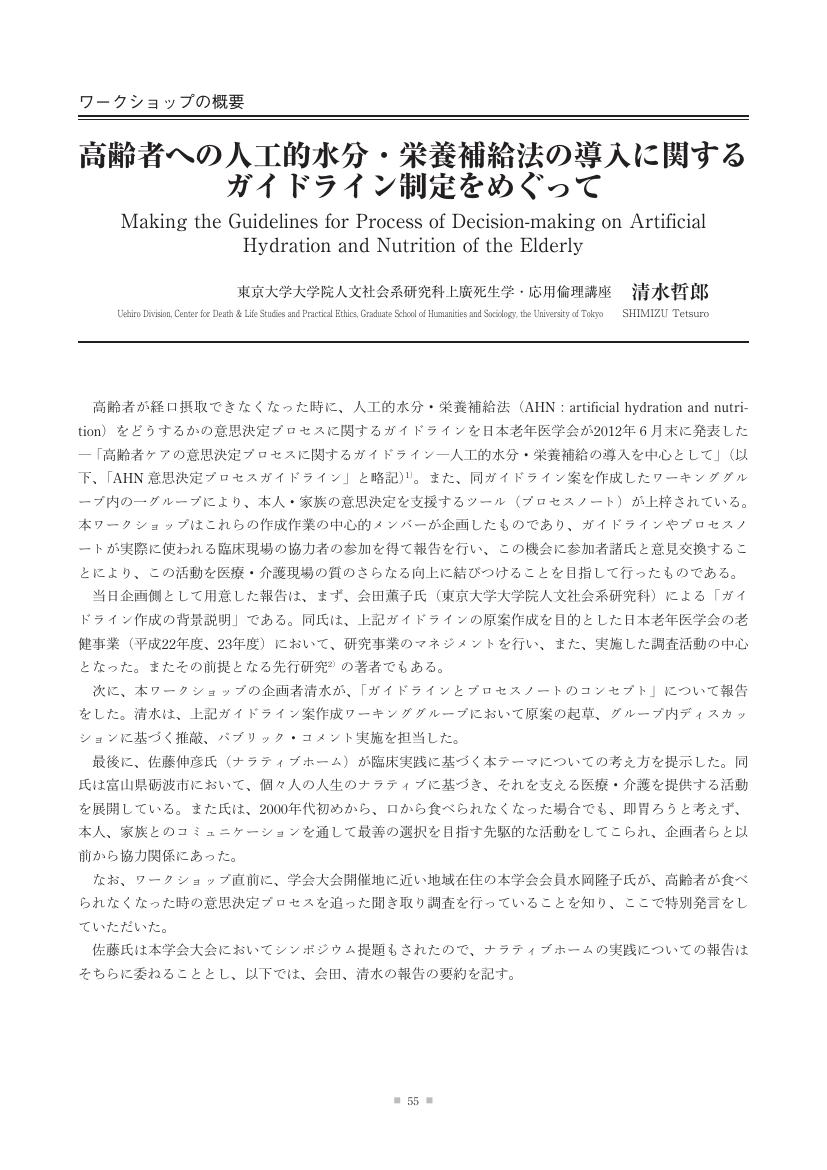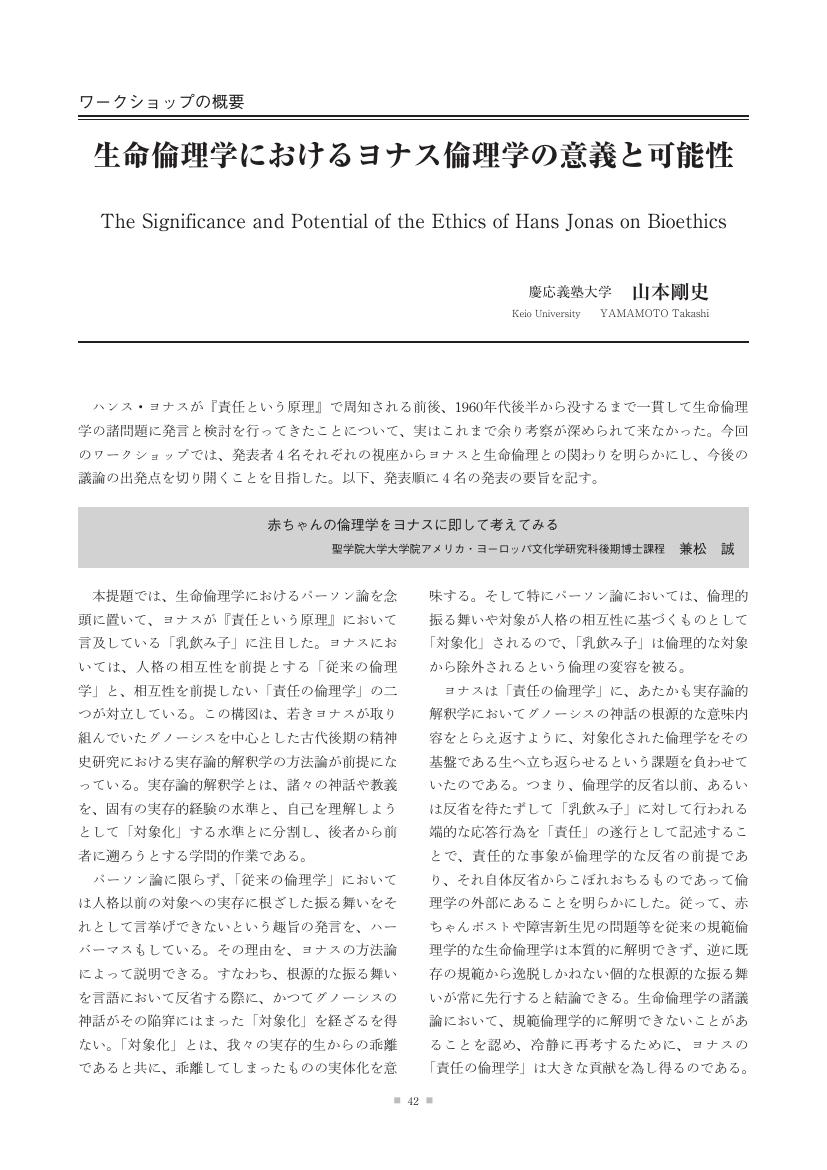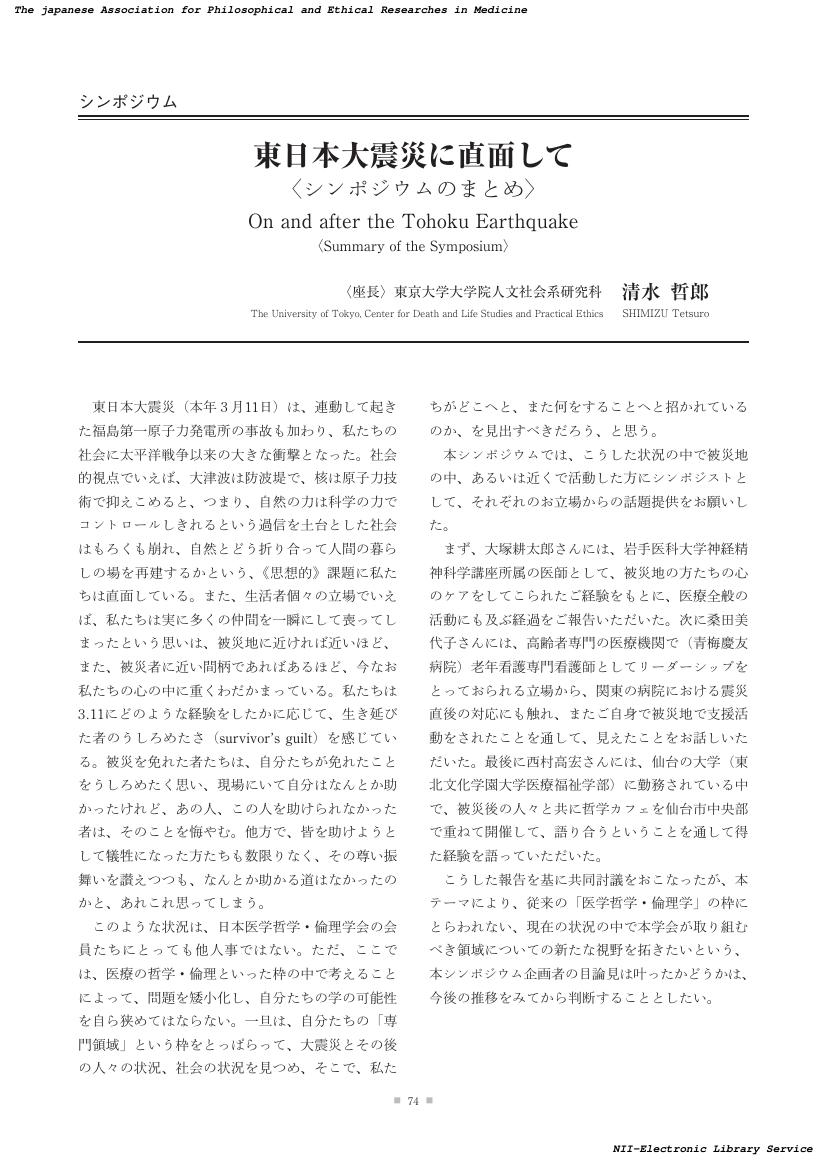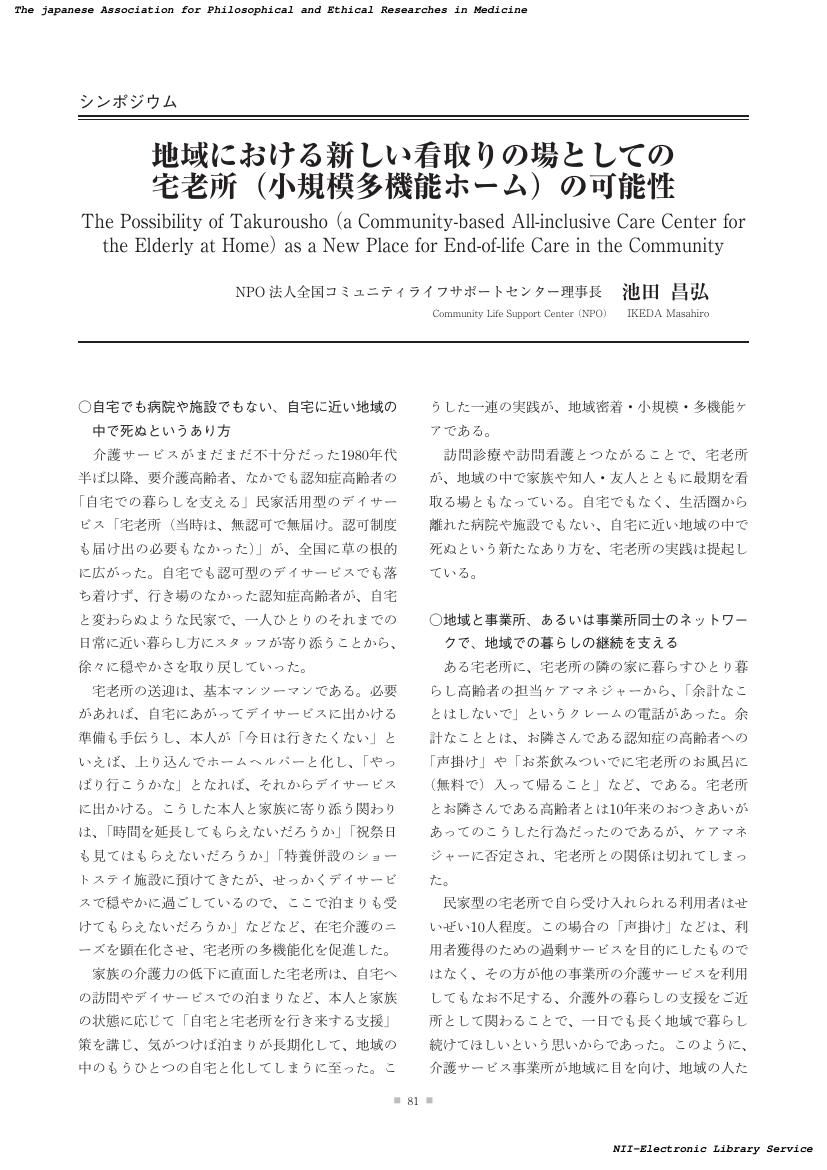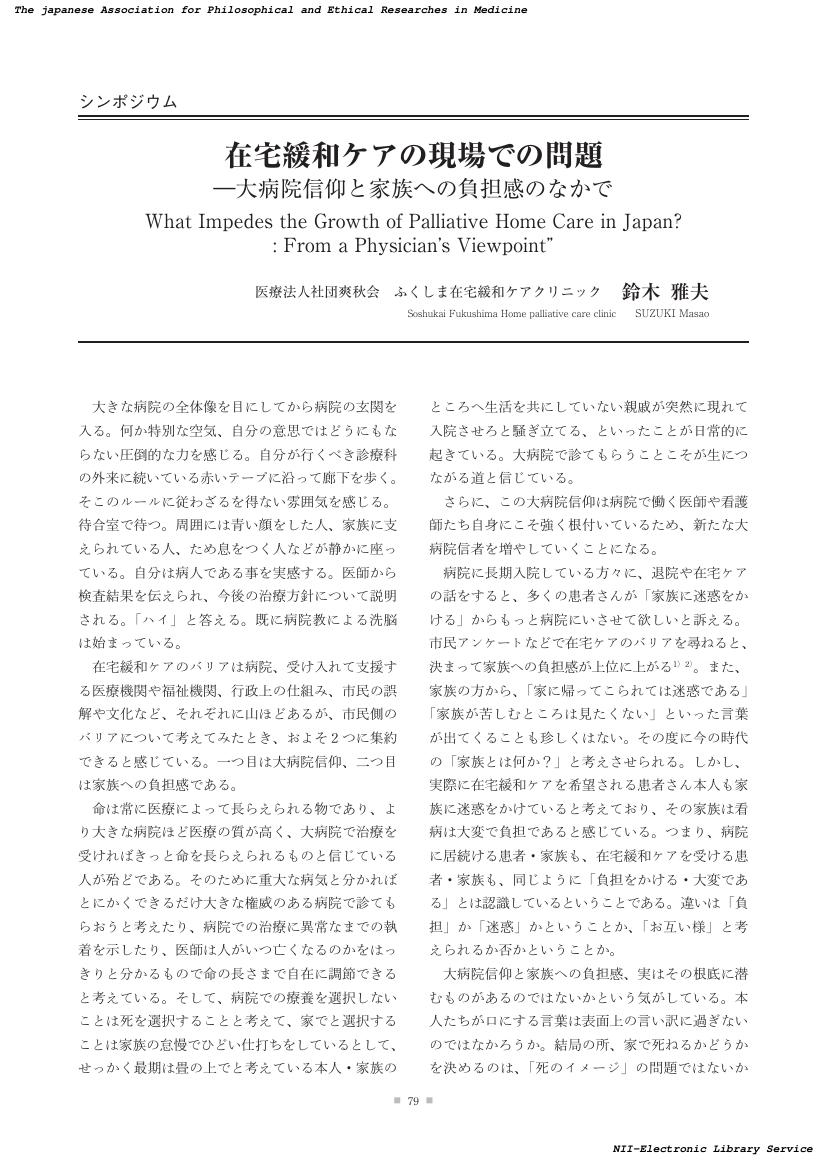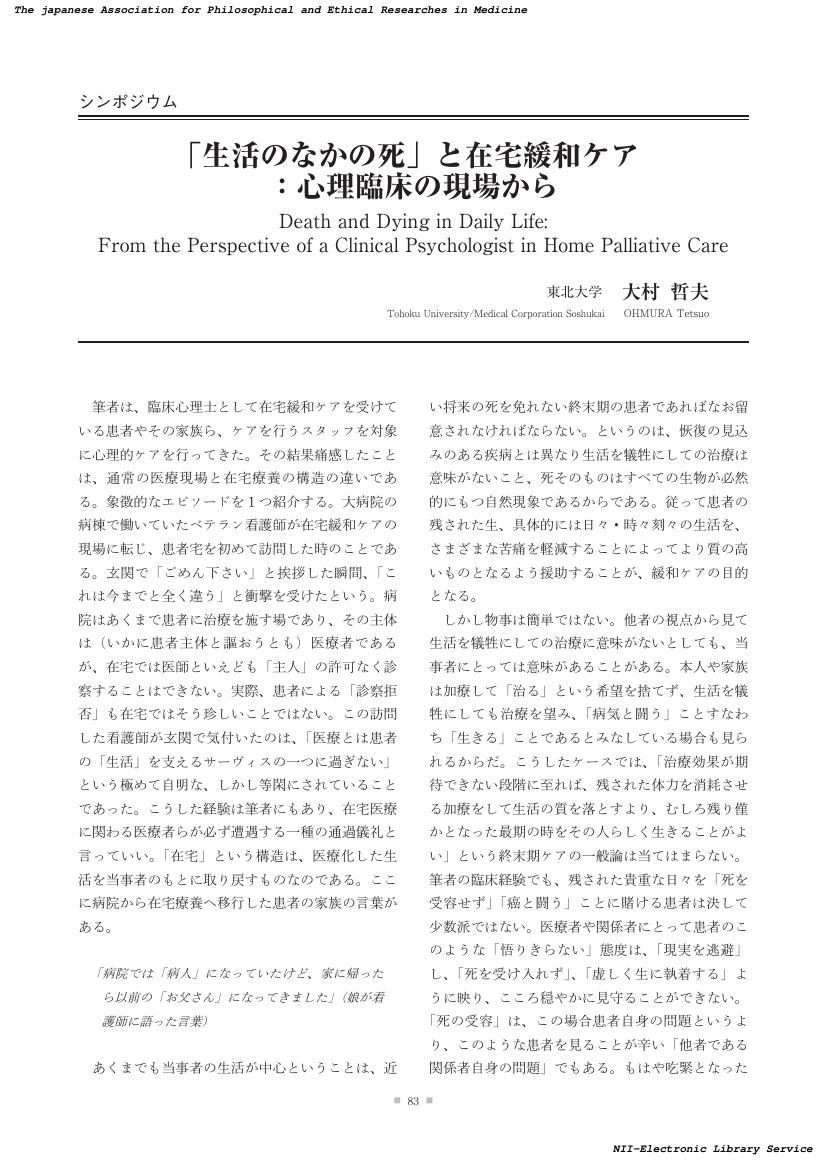1 0 0 0 OA 生老病死/ライフコース 臨床において人生苦をいかに受け止めるか
- 著者
- 竹内 慶至 浅見 洋
- 出版者
- 日本医学哲学・倫理学会
- 雑誌
- 医学哲学 医学倫理 (ISSN:02896427)
- 巻号頁・発行日
- vol.31, pp.72-73, 2013 (Released:2018-02-01)
1 0 0 0 OA 高齢者への人工的水分・栄養補給法の導入に関するガイドライン制定をめぐって
- 著者
- 清水 哲郎
- 出版者
- 日本医学哲学・倫理学会
- 雑誌
- 医学哲学 医学倫理 (ISSN:02896427)
- 巻号頁・発行日
- vol.31, pp.55-58, 2013 (Released:2018-02-01)
- 著者
- 宮坂 道夫
- 出版者
- 日本医学哲学・倫理学会
- 雑誌
- 医学哲学 医学倫理 (ISSN:02896427)
- 巻号頁・発行日
- vol.31, pp.51-54, 2013 (Released:2018-02-01)
1 0 0 0 OA 遺伝子情報のプライバシーと差別をめぐる倫理的法的社会的問題(ELSI)の検討
- 著者
- 瀬戸山 晃一
- 出版者
- 日本医学哲学・倫理学会
- 雑誌
- 医学哲学 医学倫理 (ISSN:02896427)
- 巻号頁・発行日
- vol.31, pp.46-50, 2013 (Released:2018-02-01)
1 0 0 0 OA 生命倫理学におけるヨナス倫理学の意義と可能性
- 著者
- 山本 剛史
- 出版者
- 日本医学哲学・倫理学会
- 雑誌
- 医学哲学 医学倫理 (ISSN:02896427)
- 巻号頁・発行日
- vol.31, pp.42-45, 2013 (Released:2018-02-01)
1 0 0 0 OA IC における「会話モデル」を補うもの
- 著者
- 石田 安実
- 出版者
- 日本医学哲学・倫理学会
- 雑誌
- 医学哲学 医学倫理 (ISSN:02896427)
- 巻号頁・発行日
- vol.31, pp.22-32, 2013 (Released:2018-02-01)
In recent years, in discussing informed consent obtained between a doctor and a patient, we normally endorse the so-called“ conversation model” over the“ information disclosure model” ― for good reason. The advantages of the“ conversation model,” which integrates two-way communication between a doctor and a patient, are that it pays much more respect to a patient’s autonomy and that the doctor can correct the patient’s misunderstanding during the process; they mark a distinction from the“ information disclosure model” which is based on simple one-way communication. Close examinations of the“ conversation model” reveal a hidden, essentially asymmetric relationship between a doctor and a patient, however. Furthermore, we can see that the model’s assumption that a patient is a“ reasonable person” who is always capable of making rational or reasonable judgments is not convincing at all, when we discuss patients who are rarely in a position in which they can give any reasonable thinking. It turns out that the model has several practical problems as well. Given the essential doctor-patient asymmetric relation, what do we need to apply the model in a more practical fashion? This paper attempts to give an answer to that question by examining Howard Brody’s“ transparency standard.” The standard makes the model meet practical and legal purposes required for actual medical practices, but appear to lead us to what I call“ moderate or liberal paternalism.”
1 0 0 0 OA 補完代替医療に対する規制と受容 「患者中心の医療」という観点から
- 著者
- 森 禎徳
- 出版者
- 日本医学哲学・倫理学会
- 雑誌
- 医学哲学 医学倫理 (ISSN:02896427)
- 巻号頁・発行日
- vol.31, pp.1-10, 2013 (Released:2018-02-01)
In this study, we first state that, although the majority of patients access complementary and alternative medicine (CAM) for the purpose of medical treatment or therapy, most conventional medical professionals(especially physicians) believe“ Evidence-Based Medicine (EBM)” to be the only legitimate principle and tend to hold CAM in contempt. Furthermore, we point out that the deficiency of legal regulations for CAM causes a serious problem that a vast number of patients depend on ineffective or even unsafe CAM. Stemming from this, we stress the importance of introducing particular regulatory frameworks for CAM as“ medicine.” Then, we argue for the significant benefits produced by regarding CAM as a part of the field of medicine and enumerate the conditions necessary to utilize CAM effectively within the current medical system, considering the advantages as well as the limitations of EBM. In conclusion, we emphasize the necessity of“ Medical Pluralism” to ensure the safe and effective use of CAM to properly respond to the health needs of patients. Conventional medicine based on EBM is reliable but still limited in many ways. Therefore, a lot of patients are dissatisfied with current medical care in Japan. As far as we accept these facts, we must recognize that“ Medical Pluralism” can be the essential idea which enables the integration of CAM and EBM into the holistic medical care system truly required by patients.
1 0 0 0 OA 合意形成の倫理的基礎づけについて
- 著者
- 坪井 雅史
- 出版者
- 日本医学哲学・倫理学会
- 雑誌
- 医学哲学 医学倫理 (ISSN:02896427)
- 巻号頁・発行日
- vol.30, pp.30-39, 2012-09-30 (Released:2018-02-01)
When we discuss medical technology or its application to healthcare, we often refer to "consensus building." However, we rarely hear this term used in the context of discussions concerning ethics. Consensus alone cannot guarantee ethical behavior, however, and so there is a need to consider possible ways of justifying the application of consensus to ethics, as well as to develop a mode of consensus building that is ethically appropriate. At the outset of this study, I introduce prior Japanese scholarship related to this issue, as a means of prefacing my discussion. Next, I suggest that the narrative method can play a positive role in the consensus building process. More specifically, in the context of a discussion of advanced medical technology, I state that "narrative consensus building" plays an important role. This is due to the fact that we are required to evaluate such advanced medical technologies during the long process through which they come to be accepted within societies. The question of whether these technologies should be accepted cannot be answered only through cost-benefit analysis. Therefore, we need to adopt a narrative mode of thought when pursuing a process of consensus building. Finally, I take up the role of bioethicists in the process of consensus building. First, they can be the facilitators of such discussions. Secondly, they can serve as narrators themselves, producing the narratives that make it possible to imagine a future society within which we have adopted advanced medical technologies.
1 0 0 0 OA 配偶子ドナーの保護と権利について
- 著者
- 遠矢 和希
- 出版者
- 日本医学哲学・倫理学会
- 雑誌
- 医学哲学 医学倫理 (ISSN:02896427)
- 巻号頁・発行日
- vol.30, pp.68-73, 2012-09-30 (Released:2018-02-01)
In Japan, there is little discussion about gamete donation for Assisted Reproductive Technology (ART) amongst the general public. Nevertheless, gamete donors' situations and rights should be considered when the government regulates ART. A report by a committee of the Health, Labour and Welfare Ministry in 2003 made recommendations for the regulation of ART, and also made proposals for the Informed Consent (IC) of gamete donors. A report by The Ethics Committee of the American Society for Reproductive Medicine and a guideline by the New York State Department of Health contribute to the understanding of the protection of donors' autonomy and rights. Through interpreting these documents and other papers, gamete donors' rights of anonymity, remuneration, etc. involve ethical issues concerning the welfare of the resulting children. These rights of gamete donors also affect the relationships among the people concerned including the resulting children. Through discussing the theme of gamete donors' rights and the protection of autonomy in this paper, it became clear that gamete donors should recognize their responsibilities and liabilities in relation to the welfare of the resulting children. The resulting children's welfare should be considered when determining gamete donors' rights and IC in regulating ART and gamete donation in Japan.
1 0 0 0 OA 震災は哲学を試す? : 被災地での「哲学的実践」の試み(東日本大震災に直面して)
- 著者
- 西村 高宏
- 出版者
- 日本医学哲学・倫理学会
- 雑誌
- 医学哲学 医学倫理 (ISSN:02896427)
- 巻号頁・発行日
- vol.30, pp.81-85, 2012-09-30 (Released:2018-02-01)
- 著者
- 桑田 美代子
- 出版者
- 日本医学哲学・倫理学会
- 雑誌
- 医学哲学 医学倫理 (ISSN:02896427)
- 巻号頁・発行日
- vol.30, pp.76-80, 2012-09-30 (Released:2018-02-01)
1 0 0 0 OA ヨナス倫理学における「犠牲」について
- 著者
- 山本 剛史
- 出版者
- 日本医学哲学・倫理学会
- 雑誌
- 医学哲学 医学倫理 (ISSN:02896427)
- 巻号頁・発行日
- vol.30, pp.52-62, 2012-09-30 (Released:2018-02-01)
In this article, I show the significance of Hans Jonas' ethics of responsibility in the situation wherein the ethical problems of technology extend from the present to the future generations. Jonas used his consideration of the problem of bioethics of experiments on a human body as his opportunity to begin his study of ethics in earnest. At the same time, he criticizes the re-definition of death as this enables and promotes the practice of organ transplants from an irreversibly comatose donor. Both human body experiments and the re-definition of death are considered from the viewpoint of the defenseless victim who is sacrificed in the name of medical progress to save lives and conquer disease. Jonas insists on the "-descending order of permissibility-" as a general principle to prevent sacrificing the defenseless victim. According to Jonas' philosophy of life, it is not appropriate to understand the human mind and body as separate entities. Life itself is not lost even if it is assumed that consciousness does not recover if the body lives. Extraction of organs from such a person who is incapable of putting up a defense constitutes a sacrifice of the defenseless victim. Jonas positions future generations as the ultimate victim in "the principle of responsibility" and advocates a new ethic to forbid the act that offers them in a one-sided sacrifice. He reforms ethics from a form that assumes the individual and autonomous subject to a form that considers the relationship between the subject and object of the responsibility. Jonas shows that the fundamental human character, that is, two paradigms of the responsible subject, "parent" and "politician" enables one to make a self-sacrifice through one's identification with his/her problem. The ethics of Hans Jonas is imbued with the idea of prevention of sacrifice of the victim.
1 0 0 0 OA シンポジウムのまとめ(東日本大震災に直面して)
- 著者
- 清水 哲郎
- 出版者
- 日本医学哲学・倫理学会
- 雑誌
- 医学哲学 医学倫理 (ISSN:02896427)
- 巻号頁・発行日
- vol.30, pp.74-75, 2012-09-30 (Released:2018-02-01)
1 0 0 0 OA 果して強国は醒めたりや
1 0 0 0 OA 病原生物との共生への一視座 : 動物の感染症の倫理的問題の検討をつうじて
- 著者
- 安部 彰
- 出版者
- 日本医学哲学・倫理学会
- 雑誌
- 医学哲学 医学倫理 (ISSN:02896427)
- 巻号頁・発行日
- vol.30, pp.1-10, 2012-09-30 (Released:2018-02-01)
This study had two objectives. First, we examined the possibility of animal infectious diseases being caused by humans, clarifying specific links between anthropogenic changes to freshwater ecosystems and the emergence(or spread) of Koi Herpes Virus disease(KHVD). Second, we considered related ethical problems. We concluded that there is no ethical justification for the KHVD case from a utilitarian perspective. Furthermore, we should endeavor to promote precautionary environmental management to decrease the number and spread of animal(and human) infectious diseases.
- 著者
- 池田 昌弘
- 出版者
- 日本医学哲学・倫理学会
- 雑誌
- 医学哲学 医学倫理 (ISSN:02896427)
- 巻号頁・発行日
- vol.29, pp.81-82, 2011-09-30 (Released:2018-02-01)
- 著者
- 鈴木 雅夫
- 出版者
- 日本医学哲学・倫理学会
- 雑誌
- 医学哲学 医学倫理 (ISSN:02896427)
- 巻号頁・発行日
- vol.29, pp.79-80, 2011-09-30 (Released:2018-02-01)
- 著者
- 大村 哲夫
- 出版者
- 日本医学哲学・倫理学会
- 雑誌
- 医学哲学 医学倫理 (ISSN:02896427)
- 巻号頁・発行日
- vol.29, pp.83-84, 2011-09-30 (Released:2018-02-01)
1 0 0 0 OA 生活のなかの死:地域社会での看取りを考える(シンポジウムのまとめ)
- 著者
- 竹之内 裕文 大谷 いづみ
- 出版者
- 日本医学哲学・倫理学会
- 雑誌
- 医学哲学 医学倫理 (ISSN:02896427)
- 巻号頁・発行日
- vol.29, pp.77-78, 2011-09-30 (Released:2018-02-01)

